Alcoa CEO affirms promise of no new aluminum smelters

Alcoa Corp.’s top executive is doubling down on his company’s promise to not add new aluminum capacity, indicating the world shouldn’t rely on the largest U.S. aluminum producer to help ease supply pains.
Chief Executive Officer Roy Harvey said Tuesday that Alcoa has no plans to add capacity by building or restarting aluminum smelters. His words reiterate a position made by the Pittsburgh-based company in November, which vowed to only build low-emission mills using technology from a venture dubbed Elysis.
“We choose not to invest in conventional technology — that brownfield or greenfield capacity,” Harvey said during a BMO Capital Markets conference in Florida. “We’re just not going to do it because by the time you design and start to construct, Elysis as a package will be ready to go.”
Harvey’s comments are significant given aluminum’s surge to an all-time high on Monday as Russia’s invasion of Ukraine compounds ongoing global shortages of the industrial metal used in goods ranging from autos and airplanes to appliances and packaging.
Elysis is a joint venture between Alcoa and Rio Tinto Group that developed technology to make aluminum with production methods that don’t emit carbon dioxide. Alcoa has said it expects the project will produce at commercial scale in a few years, and vowed in November that any new capacity would only be built using this technology.
Shares of Alcoa surged as much as 14% on Tuesday in New York, while benchmark aluminum prices in London gained up to 3.7%. The global market swung to a 1.9 million-ton deficit last year, according to the World Bureau of Metal Statistics.
Harvey said Russia’s invasion of Ukraine has no direct impact on Alcoa’s business, though the war will impact the global supply of alumina, a key aluminum-making ingredient. As sanctions against Russia increase, the CEO also said Alcoa is assessing what to do about its aluminum sales to Russian companies.
(By Joe Deaux)
{{ commodity.name }}
{{ post.title }}
{{ post.date }}




Comments